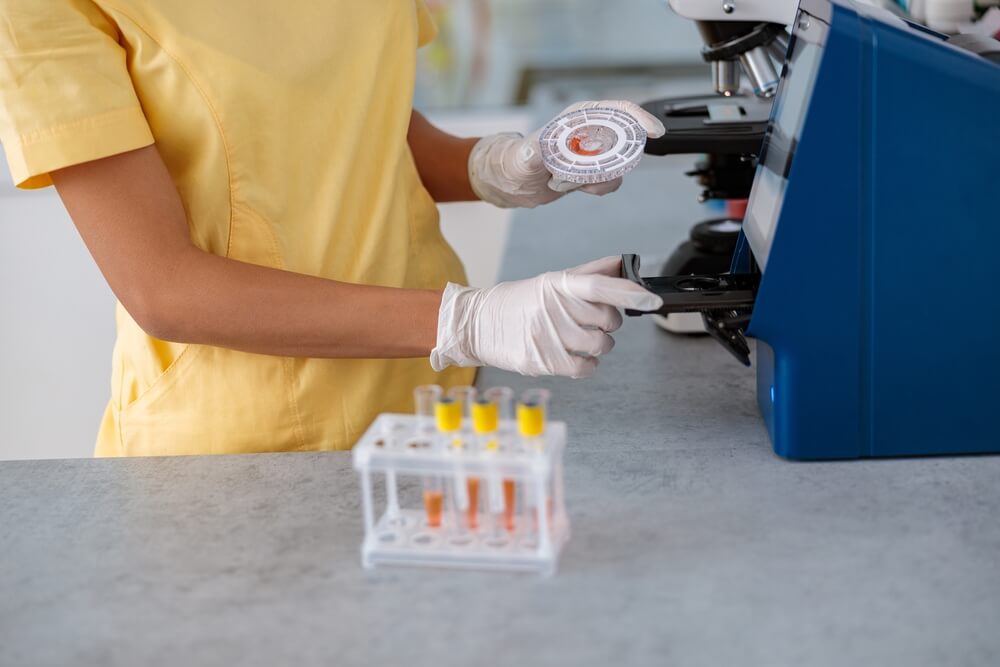
Since your pet cannot talk, we have to use every tool at our disposal to evaluate their health and find hidden problems. In addition to a thorough physical exam, we often recommend blood work to obtain a complete picture of your pet’s health. Whether your four-legged friend is healthy, ill, or needs regular monitoring, blood work can tell us a great deal about their internal function. To help you understand why we recommend blood tests for your pet, read on, and learn what each test reveals about your pet’s health.
Why is blood work important for my pet?
Blood tests are used to determine illness causes accurately and quickly, and to monitor the progress of medical treatments or chronic conditions. Regular blood testing over the course of your pet’s lifetime will establish a baseline of their normal values, allowing us to detect small changes that can indicate development of a serious health issue.
Depending on the situation, we may test the blood sample in our in-house laboratory, or use an outside laboratory for additional or specialized testing.
What does my pet’s blood work mean?
In general, two main blood tests—a complete blood count (CBC) and blood chemistry profile—are run on healthy pets. We may recommend additional testing to fully diagnose a condition, based on the initial information provided by traditional blood tests. Some of the most common blood tests include:
- Complete blood count — A CBC quantifies the cell types in your pet’s body. By taking stock of your pet’s numbers of red and white blood cells, and platelets, we can determine if they are anemic or dehydrated, or have an infection, inflammation, or clotting issue. If your pet needs surgery, a CBC is an essential part of their pre-anesthetic testing to detect bleeding disorders, dehydration, infection, or anemia that needs correcting prior to their procedure.
- Blood chemistry profile — A blood chemistry profile imparts important information about your pet’s organ function and electrolyte levels. For example, ALP (i.e., alkaline phosphatase) and ALT (i.e., alanine aminotransferase) changes may indicate liver damage. BUN (i.e., blood urea nitrogen) and CRE (i.e., creatinine) elevations indicate kidney function issues. Blood chemistry profiles also measure calcium, phosphorus, potassium, chloride, and sodium, which can show electrolyte imbalances. Additionally, a chemistry profile shows blood glucose, which can indicate whether a pet is hypoglycemic or diabetic.
- Thyroid panel (T4) — As pets age, we often recommend checking a T4 panel, which measures their thyroid hormone level. Older pets are more likely to develop thyroid disorders, with dogs more prone to hypothyroidism, but cats more prone to hyperthyroidism.
Specialized blood tests that are sent to outside laboratories can measure cortisol levels, early kidney disease, and much more. If your pet is predisposed to developing a certain condition—for example, a geriatric cat is prone to kidney disease—we may recommend including a specialized test as part of your pet’s routine early detection screening.
When should my pet have blood work?

Your pet should have blood work performed for a variety of reasons, but we usually recommend blood work for your pet in these four circumstances:
- Illness or injury — If your pet is vomiting, has diarrhea, or is not acting like themselves for any reason, blood work can reveal the cause.
- Therapeutic drug monitoring — If your pet is on medication for a chronic condition, such as epilepsy, heart disease, or a thyroid imbalance, they will need regular monitoring, to ensure their dosage does not need adjustment. Routine testing will determine if your pet’s medication dosage is staying in the therapeutic range.
- Disease progression monitoring — If your pet has an ongoing disease process, such as kidney or liver disease, regular blood work will help monitor their progression, find the most effective treatment, and allow us to better tailor a customized plan.
- Routine early detection screening — Blood work can detect disease early, before becoming serious, and is therefore an essential component of your pet’s preventive care plan problem. Rather than waiting until you can observe disease signs, routine screening tests can show subtle changes in patterns over time, providing clues about underlying health concerns.
Routine blood work is an important part of early detection screening for your four-legged friend. If you have questions about when your pet is due for their wellness exam, including blood work, don’t hesitate to ask our team.
